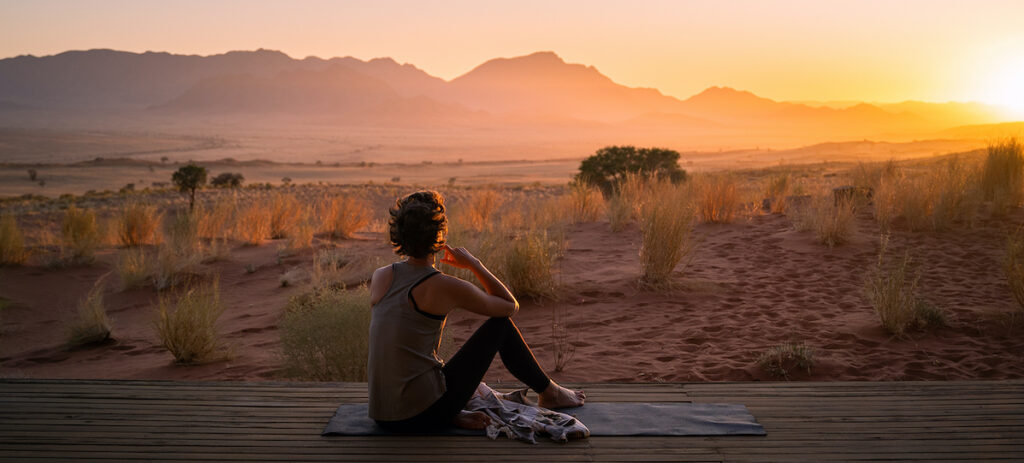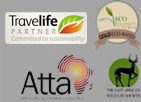
Image © Wolwedans Dune Camp
Namibia is a thrilling destination to experience, whether you choose to explore independently on a self drive itinerary or on one of our recommended flying circuits.
Our travel information section aims to provide you with useful information and resources for your trip to this fascinating country.
- Contact us for more information or to discuss your travel plans with one of our dedicated travel consultants.
-
Getting There
Namibia’s main international airport is Hosea Kutako International Airport (WDH) and is 25 miles from the Capital Windhoek.
There are no direct flights from UK or US into Namibia, most routes involve flying via Europe &/or South Africa
The domestic airport, EROS is used for serving domestic flights and charters around the country.
You can check your best flight route here
-
Time Zone
Time zone in Namibia is GMT+2
-
Security & General Travel Safety
To view the current travel advisory to Namibia click here: UK & USA
Our head office is based in Nairobi and we work with reputable safari companies who are located on the ground in Namibia. These companies are the eyes and ears on the ground and can inform our head office in Nairobi of any security situation as it may happen, ensuring that we can act and respond swiftly.
Other general travel safety advice:
– In the cities and main tourist areas, be on the alert for handbag snatchers and pick pockets.
– Do not travel with any precious jewellery items.
– Make copies of your travel documents and keep these in a safe place – separate from the original documents.
– Split out cash into separate bundles of small amounts and keep separately.
– Ensure that luggage can be locked.
– Always wear sear belts whilst traveling in vehicles and ensure doors are locked.
-
Currency
The Namibian Dollar N$ is the official currency of Namibia, and is tied to the South African Rand. The Rand is also accepted in Namibia alongside the Namibian Dollar.
Visa and MasterCard credit cards are accepted in most hotels and lodges, however some properties in remote areas and petrol stations and many smaller shops only accept cash, so it is advised to have enough Namibian Dollars in cash to cover your costs.
Ensure to travel with lower denomination notes, as change given from high tender notes may not be easily available.
Always inform your bank that you are travelling outside of the country as they might block any attempt to withdraw cash or use card machines if they have not been informed beforehand.
-
Tips & Gratuities
Tipping is entirely at your discretion and although it is not a requirement it is customary to tip for good service.
Tips are well received in Namibian Dollars (N$) and it is usual to tip at the end of your stay. Some hotels/lodges will have a tip box for the camp staff team.
There is not a set amount to tip, so please take the following information as a guideline:
Guides – Equivalent to US$20cash per person /per day.
Camp Staff Team – Equivalent to US$20 per person /per day.
-
Health Information
Malaria:
It is advised that visitors take malaria precautions when travelling to Namibia. It is recommended that you contact your Doctor or Travel Health Clinic at least 6-8 weeks prior to travel.
You can reduce the risk of malaria by using prophylactics (which should be started before arriving in Namibia and under your doctor’s guidance) and by following these simple procedures:
– Wear long sleeves and long trousers to avoid bites from mosquitos, insects and ticks.
– Apply mosquito repellents on a regular basis to exposed skin.
– Where possible sleep under a mosquito net.
– Burn an insect/mosquito repellent candle or coil.
All travellers should be aware of the signs and symptoms of malaria and should be advised to seek immediate medical attention if these occur either whilst abroad or up to a year after their return. Speak to your Doctor or Travel Health Clinic for more information.
Schistisimiasis:
Schistosomiasis is a parasitic infection, where Schistosoma larvae are released from infected freshwater snails and can penetrate intact human skin following contact with contaminated freshwater. Travellers may be exposed during activities such as wading, swimming, bathing or washing clothes in freshwater streams, rivers or lakes.
Schistosomiasis infection may cause no symptoms, but early symptoms can include a rash and itchy skin (‘swimmer’s itch’), fever, chills, cough, or muscle aches. If not treated, it can cause serious long term health problems such as intestinal or bladder disease.
– All travellers should avoid wading, swimming, or bathing in fresh water. Swimming in adequately chlorinated water or sea water is not a risk for schistosomiasis
– Drink water that is boiled, filtered or bottled.
– Application of insect repellent before exposure to fresh water, or towel drying after possible exposure to schistosomiasis are not reliable in preventing infection.
– All travellers who may have been exposed to schistosomiasis should have a health check to test for schistosomiasis infection
Vaccinations:
Yellow fever is required if traveler has been in a yellow fever endemic country within 6 months of arrival.
The recommendations regarding vaccinations & anti-malaria tablets need to be discussed with a professional, therefore it is advised that you contact your Doctor/medical centre/ travel health clinic for up-to-date details, this should ideally be done at least 8 weeks before you travel.
COVID-19:
There are currently no COVID-19 testing or vaccination requirements for travellers entering Zimbabwe, but please check this before you travel.
For more information see the Centres for Disease Control and Prevention
-
Drinking Water & De-Hydration
- Drinking Water:
Do not drink water straight from the tap, always drink & brush teeth from bottled water.
Be aware that ice for drinks may be made using tap water, so it is best to request drinks without ice.
De-Hydration
Always take a bottle of drinking water in your day bag on any activity or excursions – even if it’s a short one – and take regular, small drinks of water.
Wear a hat and sunscreen at all times and cover up/take shade from the heat of the sun, especially during the hottest times of the day.
-
Bites & Stings
Bugs and small creatures are all a part of being in the wilds of Africa. It is of course important to take precautions against any opportunity for bites or stings, so being aware is important.
When walking in the bush always wear long trousers and enclosed shoes or walking boots , with thick socks covering the ankles for protection. When walking in long grass, check your legs and clothes for grass ticks – especially in the rainy season, even when you are wearing long trousers.
Check & shake out shoes and walking boots before putting them on.
Always look first to see where you are sitting, when picking something up or when putting your hand/foot into something, like a bag or shoe – check first!
If you think you may have been bitten or stung by something, always inform the Camp Manager & Safari Guide as soon as possible.
-
Internet, Electricity and Plug Standards
Internet availability and wifi can be sporadic whilst in Africa. It is best to think of this trip as an opportunity to take a break from the world of tech and reconnect to nature. Most lodges will have some form of internet, however we can check each hotel/lodge individually if there is a wish to know if it has an internet connection.
The main mobile provider is MTC and an option is to purchase a Sim Card.
Namibia operates on a 220V supply voltage and 50Hz. Solar power is also common in safari locations.
Namibia uses plug types, types D and M – these are round three-pin type.
-
Climate
Namibia is a year-round travel destination and is said to have over 300 days of sunshine.
Being in the Southern Hemisphere, summer months are Oct-April where daytime temperatures can exceed 35-40°C and winter months May-Sept where they can be from 18-25°C during the day. Night time temperatures can be cold, especially in where the temperature can drop below zero.
Known as one of the most arid countries in Southern Africa, Namibia however does have two main rainy seasons during the summer months; there are short rains between Sep-Nov and the main rainy season between Dec-Apr.
-
Visa & Passport Requirements
PASSPORT
• Passport valid for a least 6 months from your date of entry.
• 3 blank pages in your passportMake sure the date on your entry stamp and the amount of time you have been given to stay is correct. Immigration officials will check these details when you leave Namibia.
VISA:
• You can visit Namibia for up to 90 days without a visa. If you plan to work or volunteer, or if you want to stay longer, you must get a visa.See here for more information from the Namibia Embassy in US and here for UK
-
Clothing Suggestions
Pack lightly for your safari to include:
– Comfortable, loose fitting cotton clothing in muted and natural tones is recommended.
– Long sleeves and long trousers, shorts and t-shorts with enclosed footware.
– Jacket or fleece for early mornings and evenings, when it can get chilly.
– Swimwear & travel light beach towel.
– Hat to keep the sun off and protect from sunburn.
– Small day pack to hold water bottle, binoculars, notebook and pen, sunglasses, face/hand wipes etc.
– Please avoid camouflage-patterned clothes.
See here for our clothing packing guide
-
Travel Insurance
All travellers must have adequate and comprehensive travel health insurance. Make sure your travel insurance covers all the activities you plan on doing in Namibia and covers your full stay in the country and travel to/from.
-
Getting There



